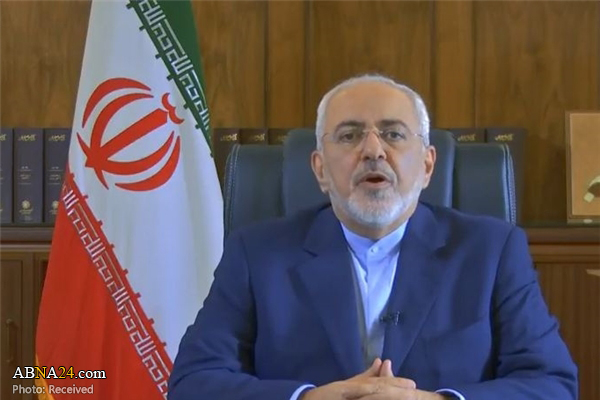(AhlulBayt News Agency) - The Iranian foreign minister also rejected any renegotiation on the country's nuclear program, arguing that a party that has violated the agreement it has already signed could not be trusted in any future talks.
Iran and the major world powers have signed a nuclear deal under which Iran agreed to curb its nuclear program in exchange for economic sanctions relief.
IAEA has verified in at least 10 reports that Iran has been fully committed to its obligations under the deal, but President Trump has threatened that Washington will pull out of the deal unless its 'disasterous flaws' are fixed.
The full text of the five-minute video that was published on Iran's FM You Tube and Twitter pages is as follows:
Hello
My name is Javad Zarif, and I'm the Iranian foreign minister.
For the first two years in my post, I spent much of my time negotiating with my counterparts from the European Union, Russia, China, Germany, France, United Kingdom and the United States. We reached a comprehensive agreement on Iran's nuclear program in 2015. We call it the JCPOA for Joint Comprehensive Plan of Action.
In the deal my country agreed to take certain concrete steps to assuage the concerns of the United States primary. The US in turn committed to remove sanctions and to seize impeding business with Iran. The deal was not a treaty to require signature or ratification by any side, but it became binding on all as it was unanimously adopted by the United Nations Security Council.
On 11 occasions, the UN nuclear watchdog has confirmed that Iran has implemented all its obligations.
In contrast, the US has consistently violated the agreement, especially by bullying others from doing business with Iran. In the last year or so, we've been told that President Trump is unhappy with the deal. And it now appears that the response from some Europeans has been to offer the United States more concessions; from our pocket.
This appeasement entails promises of a new deal that will include matters that we all decided to exclude at the outset of our negotiation, including Iran's defensive capabilities and regional influence.
But please understand on both issues it is Iran and not the West that has serious grievances and much to demand. We have not attacked anyone in centuries, but we have been invaded. Most recently, by Saddam Hussein, who was then backed by the US and its regional allies. The West even actively prevented us from buying rudimentary means of defense even as Saddam Hussein showered both Iranian civilians and soldiers with chemical weapons.
Despite that taunting experience, we still spent a fraction of countries like Saudi Arabia and the United Arab Emirates on defense, and our missiles have a shorter range than those of Saudi Arabia. And unlike US allies in the region, who have brainwashed, financed and armed groups such as Al-Qaeda, the Taliban and the ISIS, we had been pivotal in defeating these extremist groups.
Let me make it absolutely clear once and for all: we will neither outsource our security, nor will we renegotiate or add on to a deal we have already implemented in good faith. To put it in real estate terms, when you buy a house and move your family in, or demolish it to build a skyscraper, you cannot come back 2 years later and try to renegotiate the price.
In the coming days, the United States will have to decide whether to finally abide by its obligations. Iran stands firm in the face of futile attempts and bullying. But if the US continues to violate the agreement, or if it withdraws all together, we will exercise our right to respond in a manner of our choosing, bluster or threats won't get the United States new deal. Particularly as it is not honoring the deal it had already made.
Relying on cartoonish allegations, rehashed from more than a decade ago and dealt with by the IAEA to make a case for nixing the deal has fooled no one. Thus the US is well advised to finally start honoring its commitments, or it, and only it, will have to accept responsibility for the consequences of not doing so.
/257
source : IRNA
Friday
4 May 2018
7:06:50 AM
891966

The Iranian foreign minister also rejected any renegotiation on the country's nuclear program, arguing that a party that has violated the agreement it has already signed could not be trusted in any future talks.
